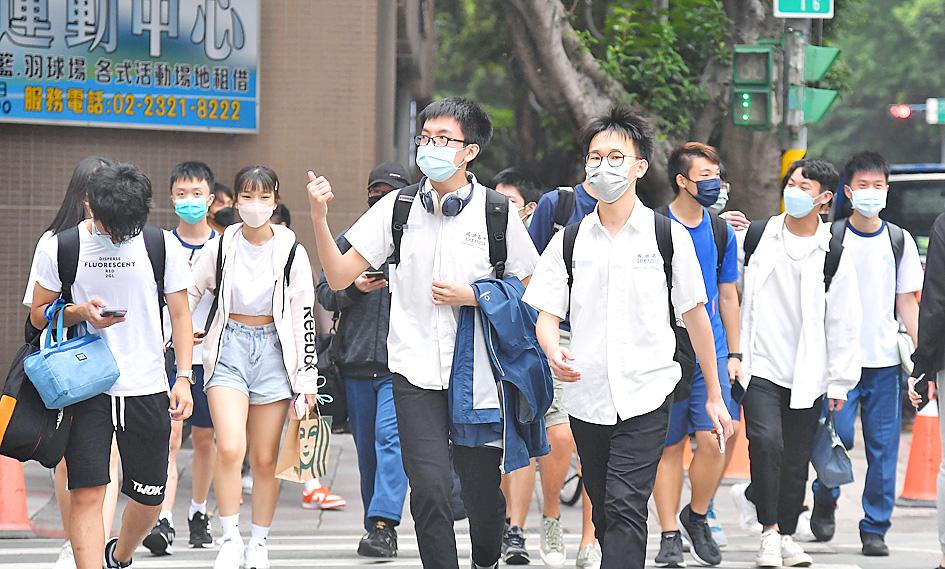From the next school year, students are no longer required to embroider their names on their school uniforms, Minister of Education Pan Wen-chung (潘文忠) said yesterday.
The Taiwan Youth Association for Democracy said it had received complaints from students who had been harassed by people who had seen their names on their uniforms and found their information online.
The K-12 Education Administration convened a meeting involving all education-related authorities, including representative groups for school presidents, parents and students, to discuss the issue, Pan said.

Photo: CNA
All who were present agreed that students’ names should be dropped from their uniforms, but their numbers should be kept, as they could be used to identify them in an emergency, he said.
The Ministry of Education found that one-quarter of all schools in the country demand that only male students embroider their names on their uniforms, Pan said adding that schools should not discriminate based on gender.
At present, 8 percent of elementary schools require their students to have their names on their uniforms, while half of all junior-high and high schools have the requirement, Pan said.
Official notices would be sent to all authorities and schools as soon as possible, and all schools should involve parents and students and come to a conclusion that would observe the ministry’s decision before the start of the next term in August, Pan said.
It is hoped that all uniform and dress code committees discuss the issue objectively and refrain from adopting measures for the pure sake of management, Pan said.
Pan also said that he hoped schools would begin reviewing other antiquated regulations, such as forbidding students to wear warmer clothing on colder days.
Separately, the association praised the ministry’s decision, but said that schools should involve student representatives when discussing dress code policies.
The association said it respects the opinions of others regarding the decision to keep student identification numbers on uniforms, adding that it hoped all students’ right to privacy would be protected.

An undersea cable to Penghu County has been severed, the Ministry of Digital Affairs said today, with a Chinese-funded ship suspected of being responsible. It comes just a month after a Chinese ship was suspected of severing an undersea cable north of Keelung Harbor. The National Communications and Cyber Security Center received a report at 3:03am today from Chunghwa Telecom that the No. 3 cable from Taiwan to Penghu was severed 14.7km off the coast of Tainan, the Ministry of Digital Affairs said. The Coast Guard Administration (CGA) upon receiving a report from Chunghwa Telecom began to monitor the Togolese-flagged Hong Tai (宏泰)

A cat named Mikan (蜜柑) has brought in revenue of more than NT$10 million (US$305,390) for the Kaohsiung MRT last year. Mikan, born on April 4, 2020, was a stray cat before being adopted by personnel of Kaohsiung MRT’s Ciaotou Sugar Refinery Station. Mikan was named after a Japanese term for mandarin orange due to his color and because he looks like an orange when curled up. He was named “station master” of Ciaotou Sugar Refinery Station in September 2020, and has since become famous. With Kaohsiung MRT’s branding, along with the release of a set of cultural and creative products, station master Mikan

RISING TOURISM: A survey showed that tourist visits increased by 35 percent last year, while newly created attractions contributed almost half of the growth Changhua County’s Lukang Old Street (鹿港老街) and its surrounding historical area clinched first place among Taiwan’s most successful tourist attractions last year, while no location in eastern Taiwan achieved a spot in the top 20 list, the Tourism Administration said. The listing was created by the Tourism Administration’s Forward-looking Tourism Policy Research office. Last year, the Lukang Old Street and its surrounding area had 17.3 million visitors, more than the 16 million visitors for the Wenhua Road Night Market (文化路夜市) in Chiayi City and 14.5 million visitors at Tainan’s Anping (安平) historical area, it said. The Taipei 101 skyscraper and its environs —

Taiwan on Friday said a New Zealand hamburger restaurant has apologized for a racist remark to a Taiwanese customer after reports that it had first apologized to China sparked outrage in Taiwan. An image posted on Threads by a Taiwanese who ate at Fergburger in Queenstown showed that their receipt dated Sunday last week included the words “Ching Chang,” a racial slur. The Chinese Consulate-General in Christchurch in a statement on Thursday said it had received and accepted an apology from the restaurant over the incident. The comment triggered an online furor among Taiwanese who saw it as an insult to the